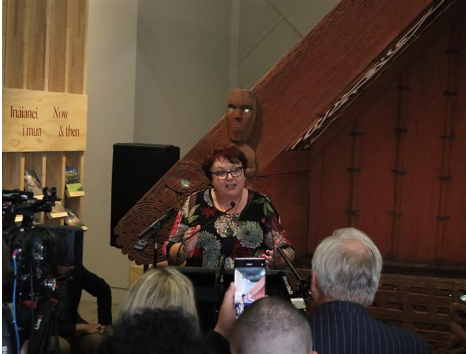Published: 23rd April 2021

23rd April 2021 at the Dowse
Kei aku nui, kei aku rahi,
kua hui mai nei
ki raro i te mana o te whare e tū nei,
tēnā koutou katoa
I would like to acknowledge the Minister of Local Government Hon Nanaia Mahuta, the Iwi and Mana Whenua, leaders of local government, LGNZ, Taituarā, panel members, dowse staff and distinguished guests.
I’m responding to you today as Hutt City Te Awakairangi CEO and also as the Wellington Regional Representative on Taituarā Board, so I hope I can speak on behalf of my fellow CEs whom I acknowledge here today.
Globally, nationally and locally we face era scale change, on a par with the Industrial revolution. We need to move to different energy sources, to take much greater care of how we use land and natural resources. We need to reduce our waste and protect the environment that sustains us whilst also facing the automation of all routine work. This means that everything will need to be done differently - where and how people live, how and where work happens, how people travel, how food is supplied, how learning happens .
Whilst this is a global challenge requiring international action, and a national challenge requiring central government to create national /local incentives, the powers and funding to support urgently needed change, above all it is a community challenge. Community by community, how and where we live, work, learn and connect is where impacts will hit home and “doing differently” will actually take place. Local government has a pivotal role to play in enabling our people to make these 21st century transitions in a way that protects and enhances wellbeing and reduces inequity.
We must be deliberate about putting equity at the forefront of the changes we go through. Because we need to make change on every front, we have the opportunity and responsibility to build pathways that create new futures for our community. To do that we need new systems which are grounded in concepts such as ora meaning that they are inherently designed to enhance well-being for all!
Our biggest challenge is inequity, but to beat it we must focus on ‘ora’.
Of course we can do much of that now, in setting priorities, in our policy choices, our purchasing decisions and our choice of partners, and in unleashing the inherent power and strength of communities. But we can and must do more.
Twenty years from now we need to have changed the dial for the children born today at our local hospital here in Te Awa Kairangi. And here’s what we know today about those children.
We know a child living in a decile ten area is three times more likely to die in childhood/adolescence than a child in a decile one area. The same child is three times more likely to go hungry than the other, and five times more likely to not be able to access primary health care simply due to lack of transport.
We know NCEA pass rates at all levels for children at one school in our city are almost twice the rate of another. We know that in some of our areas, almost half of our whānau are experiencing housing stress - having to choose between paying the rent, paying for heat and feeding their families. We know that in our city that needs 10,000 new homes in the next 20 years, right now 800 families are on the housing register, over 900 emergency housing special needs grants and we have too many of our children living in emergency motel accommodation. I don’t need to tell you how that breaks down along ethnic lines, suffice to say that systemic disadvantage is baked in to how we currently do things. And that’s what we need to change -an opportunity this review presents.
If you always do what you’ve always done, you will always get what you’ve always had.
No one government department, no single local government can shift the dial on housing, health, education, to change these outcomes. We must push the change to our system by unleashing the inherent power within every corner of our community and ensure that the system reflects us and therefore serves us – all of us.
We can change the dial! Through meaningful partnerships, whether that is forming co-governance relationships with iwi, or strategic alliances with the voluntary sector, NGOs and key commercial partners. As local government we must meet our partners where they are at and rise to the occasion as one public sector enabled by the appropriate powers and funding tools necessary to change that dial.
We are making a good start on some of these issues here - in our new partnership with Te Āti Awa and Kahungungu Whānau Services to ensure more safe, dry warm homes for our whānau and building pathways to housing permanency - a home for life. In our partnership with Common Unity to improve food security. In our partnership with our Chamber of Commerce to enable young people into apprenticeships and jobs. In our new commercial arrangements with partners in parks management and waste management that are paying the living wage, reducing our carbon footprint and emissions, reducing waste and extending their life of our landfill.
Partnerships like this will be happening throughout Aotearoa. We all know there is scope to do more and better, to be more joined up at a local level, to listen and enable community participation. Let’s seize the chance this review brings to define our new future that so that all of our places and all of our people thrive.
Mā tini, mā mano ka rapa te whai.
Tēnā koutou, tēnā koutou, tēnā tātou katoa
Jo Miller
Chief Executive
Hutt City Council